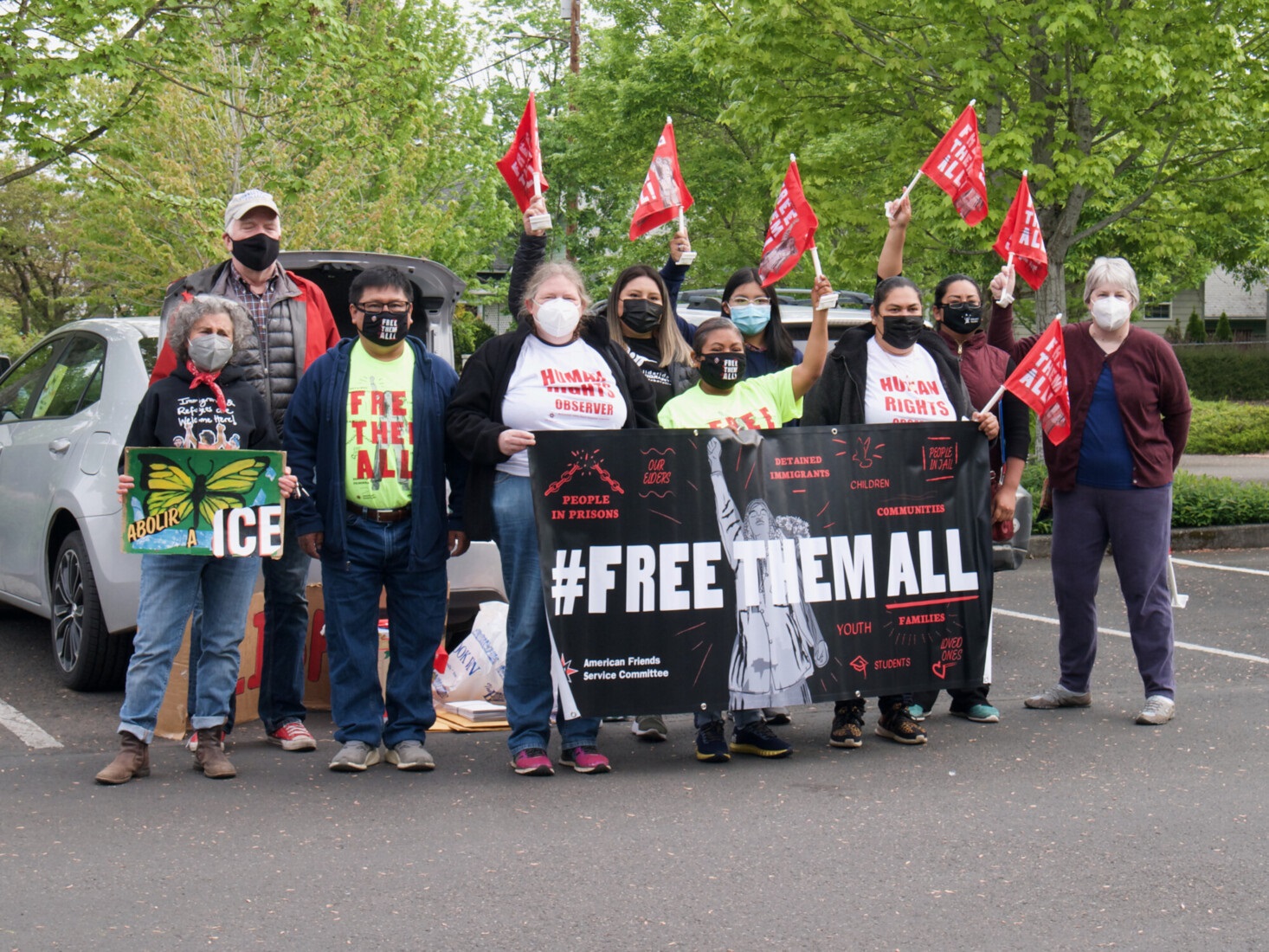
#FreeThemAll action in Oregon. Beth Ronk
Incarceration doesn’t keep us safe, and yet the U.S. wastes over $80 billion each year to keep more than 2 million people behind bars. The movements to defund the police and abolish prisons have challenged many people to think about justice in new ways – including those who are understandably concerned about reducing violence and holding people who commit violent acts accountable.
It can be hard for people to imagine a world without police and prisons, one that actually keeps everyone safe. The movements to defund the police and abolish prisons have proposed ways to reduce violence and hold people accountable that do not involve incarceration.
Abolitionists care about reducing violence.
Abolitionists want to create a world that addresses the roots of violence. Our jails and prisons are filled with people struggling with poverty and a lack of community resources. Abolitionists want to focus on changing the environments that lead to violence in the first place through programs such as XYZ. Abolition activism is a proactive approach to stopping violence before it occurs, while our current system accepts an unacceptable amount of violence and simply responds to it (usually poorly) after it happens.
The abolition movement proposes a vision that will greatly reduce the violence caused by our current system.
It’s true that the abolition movement won’t stop all violence. But imagine if the new system will allow 16,000 murders a year. The people in charge of stopping violence will kill about 1,000 people a year. We won’t know how many people will survive sexual assault each year because the system will be so bad at holding people accountable that most survivors will choose not to report the assaults. And we’ll do little to make sure the people who commit acts of harm won’t do it again in the future. You would likely say that’s an unacceptable amount of violence. But those are the realities of our current system of policing and mass incarceration.
When we think about a new system, the question should be: can we create a different system that does a better job at reducing violence?
It’s time to recognize that policing has been an abysmal failure at keeping people safe from violence.
U.S. taxpayers fund 800,000 law enforcement officers, and yet those officers rarely arrive in time to stop violence. If the police are even called, they usually arrive after a violent incident has already taken place. At best, the police sometimes stop someone from committing additional harm.
Not all activists agree on what the future should look like, but there will likely be a need for people designated to respond to violence. However, these responders don’t need to be modeled on armed police officers, and we certainly won’t need 800,000 of them. And the way we temporarily remove someone from a particular situation doesn’t need to be modeled on jails and prisons. It can be frustrating not to know all the answers right now, but our current system still doesn’t have the right answers after decades of practice.
Our current system doesn’t remove everyone who has committed violence from your life.
Most people who commit acts of violence are eventually released from prison or are never arrested, prosecuted, and convicted in the first place. The difference between our current system of mass incarceration and the abolition movement is that activists offer a vision that not only reduces violence but reduces the likelihood that people in your community who have harmed others will do it again.
Abolitionists believe in holding people accountable for harm.
One of the key criticisms activists have of our current system is that it fails to effectively hold people who commit harm accountable in a way that improves the recovery of the victim and reduces the likelihood that the person who committed harm will do it again. There are many different ideas about what accountability might look like, but you can read about some of them here
Our current system is built on revenge and vengeance, not on safety.
Sending millions of people to prison for decades has more to do with the emotional satisfaction that some people get from seeing someone punished than it does with public safety. Revenge is selfish if you consider that it privileges individuals’ emotional gratification over the needs of the community. It’s especially selfish when you consider that our emotional need for revenge has created a system of policing and incarceration that actually makes our communities more violent and less safe.
Treating people who commit harm as human beings makes our communities safer.
Abolitionist Angel Parker writes that “[b]eing an abolitionist requires unlearning every single thing we’ve been told about jails, prisons, and police since birth. It requires us to consider people as full human beings instead of ‘monsters’ and ‘psychos’ even when we don’t want to do so.” Seeing people as “monsters” keeps us from recognizing the environmental factors that lead to violence—factors that we can fix to reduce harm in our communities. For one person, a lack of financial stability might be the primary factor behind an act of violence. Another person might be struggling with trauma from violence they’ve suffered in the past and need access to mental health care. Every act of violence has its own specific context that needs to be addressed with different solutions. Prison, instead, is a one-size-fits-all solution that keeps us from addressing the specific environmental factors that lead to violence in the first place.
The world won’t change overnight.
Those who argue that abolitionists are trying to close prisons and fire all police officers tomorrow are using scare tactics. This will be a process—probably a process that will move frustratingly slow—that will move funds away from police, jails, detentions centers, and prisons to fund efforts that will address the roots of violence.